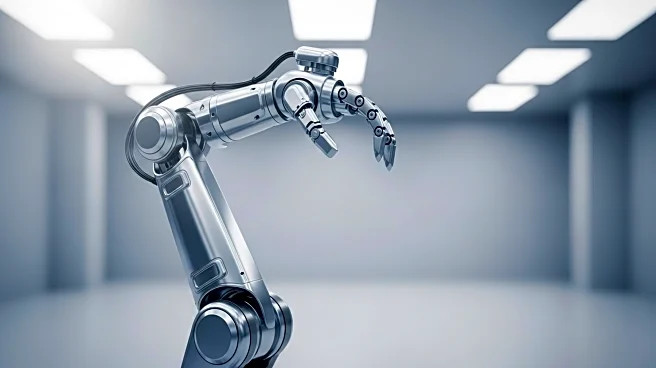What is the story about?
What's Happening?
The robotics and automation sectors are experiencing rapid growth, leading to an increased demand for skilled professionals across various industries. As businesses integrate advanced technologies into their operations, the need for experts in robotics engineering, programming, artificial intelligence, and system integration is rising. Industries such as manufacturing, healthcare, logistics, and consumer electronics are at the forefront of this trend, utilizing robots to enhance efficiency and reduce costs. The adoption of automation technologies is creating diverse job opportunities, with roles like robotics engineers, automation technicians, and system integrators becoming increasingly vital. Additionally, skills in AI, machine learning, and data analytics are gaining prominence as they enable robots to perform complex tasks autonomously.
Why It's Important?
The expansion of robotics and automation is reshaping the job market, offering new career paths and transforming existing roles. This shift has significant implications for the U.S. economy, as it can lead to increased productivity and competitiveness in key sectors. Companies that embrace automation can streamline operations, reduce labor costs, and improve product quality, potentially leading to economic growth. However, this transition also poses challenges, such as the need for workers to acquire new skills and adapt to changing job requirements. The demand for cybersecurity professionals is also rising, as protecting automated systems from cyber threats becomes crucial. Overall, the growth in robotics and automation presents both opportunities and challenges for industries and workers alike.
What's Next?
As the robotics and automation industries continue to evolve, the demand for skilled professionals is expected to grow. Educational institutions are likely to expand their offerings in robotics and automation programs to meet this demand. Companies may invest in training and development initiatives to equip their workforce with the necessary skills. Additionally, the collaboration between humans and robots is anticipated to increase, creating new roles focused on human-robot interaction and system optimization. The advancement of AI and machine learning will further enhance the capabilities of robots, requiring professionals to focus on higher-level tasks such as system design and ethical considerations.
Beyond the Headlines
The rise of robotics and automation could lead to long-term shifts in the labor market, with potential impacts on employment patterns and wage structures. Ethical considerations regarding the use of AI and autonomous systems may become more prominent, prompting discussions on regulation and governance. The integration of robots into everyday life could also influence cultural perceptions of technology and its role in society. As automation becomes more prevalent, there may be increased emphasis on ensuring equitable access to technology and addressing potential disparities in job opportunities.

















